Love Is Strange
Mozart and the Whale, which screened yesterday afternoon at the Santa Barbara Film Festival, is a Rain Man-type love story with a jumpy heart. Jumpy as in child- like, energetic, anxious.
A romanticized, tidied-up version of a complicated real-life love story, it’s about a youngish couple (Josh Hartnett, Radha Mitchell) with autism, or more particularly Asperger’s Syndrome. And this, viewing-wise, is nervy and provocative in more ways than one.
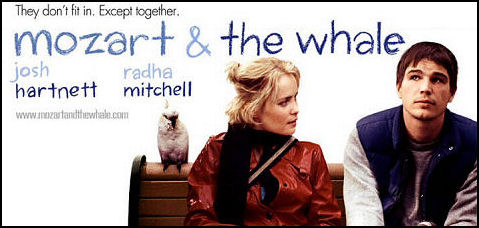
It’s not calming or swoony like other love stories because the lovers are always in a fairly hyper and unsettled state, which feels a bit challenging, but it seems real and fairly honest and is obviously on a wavelength all its own.
At first you’re thinking it needs a regular-guy character (like Tom Cruise’s selfish prick in Rainman) to provide stability and perspective, but then you get used to the manic energy of it.
< ?php include ('/home/hollyw9/public_html/wired'); ?>
And then you start enjoying more and more the vigorous cutting and the funky European-style tone (Norway’s Petter Naess directed), and particularly Hartnett and Mitchell’s performances, which feel wired and fresh and unlike anything I’ve ever gotten, tonally, from a love story before.
I guess this pogo-stick element isn’t striking a chord with very many others since Mozart and the Whale has been having difficulty finding a distributor.
Shot in early ’04, Mozart and the Whale has been released overseas and has even hit the DVD market in places like Greece and Brazil, but a U.S. theatrical release hasn’t happened and looks at this moment a bit dicey.
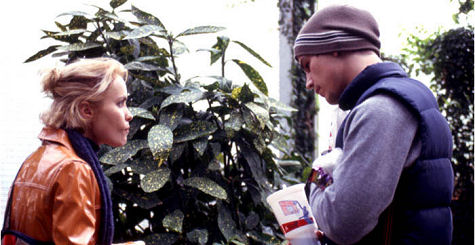
Rhada Mitchell, Josh Hartnett in Mozart and the Whale
Even Hartnett, who went to Sundance to do interviews for the mostly shitty Lucky Number Slevin, isn’t standing behind Mozart . His portrayal of Donald, a child-like mathematical genius, is easily the bravest, most emotionally wide-open thing he’s ever done, and the guy’s not here in Santa Barbara to help plug it. This seems to me like a real jerk move.
I was talking about Hartnett yesterday with a TV producer as we stood on State Street just before noon, and the TV guy told me Hartnett has “the biggest ego in the industry” and that he’s making curious calls about the films he’s starring in (Lucky Number Slevin being one glaring example) and he’s “turning stuff down left and right” and nothing he’s acted in so far has quite caught on in the right way and that his career is cooling off.
But he’s done something brash and unusual in Mozart, and he should be standing by the people who took the journey with him. Even if you happen to prefer Dustin Hoffman’s quieter, more internalized autistic behavior in Rainman (which wasn’t my reaction, not by a long shot), Hartnett’s willingness to take a flying leap and go for it is admirable and exciting.
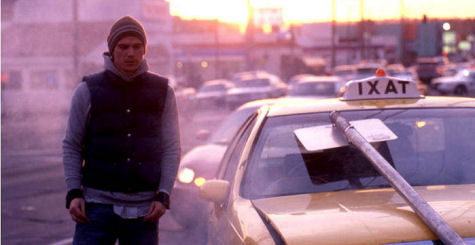
Josh Hartnett in Mozart and the Whale
For what it’s worth, a woman who said she has an autistic child stood up after yesterday’s screening and said Hartnett’s performance is authentic and spot-on. And people from Europe who are claiming to be autistic (or are close to autistic people) who’ve seen the DVD are saying the same thing in online chat rooms.
Lawrence said during the post-screening q & a that “we’re very disappointed that Josh couldn’t be here.” The IMDB says Hartnett is currently filming Texas Lullaby, a present-day retelling of “Hamlet”, but if he could attend Sundance in Park City for a weekend why couldn’t be come to Santa Barbara?
Written by Rain Man screenwriter Ron Bass, Mozart and the Whale is nothing if not alive to the moment. It’s a little twee at times and vigorously paced, but it’s not a comedy, despite what you might have read elsewhere. Call it amped or cranked up but it feels more original than not.
It’s a spirited tale about two childlike souls, Donald and Isabelle, dealing with the peaks and valleys of a turbulent love affair, but also trying to seriously build a life together.
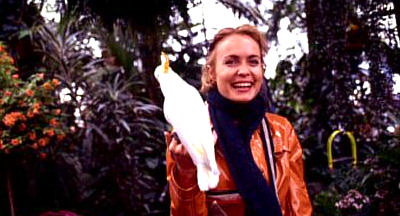
Donald (Hartnett) is a kindly eager-beaver who keeps birds in his stinky cluttered apartment and, like Dustin Hoffman’s Raymond, has a genius-like ability with numbers. He works as a taxi driver but is also an organizer of an autistic support group. He copes well but doesn’t adapt well to change.
Isabelle (Mitchell) is also austistic but bohemian. Her life-coping skills are more refined than Donald’s and she’s more goal-oriented, but in a way she’s more manic and volatile, and she has a way of setting Donald off…and vice versa.
Austistic boy meets autistic girl, they fall in love, they break up, they get together again, they break up again and get back together again and finally get married. A familiar-sounding plot, perhaps, but with odd angles and tender weirdnesses.
Whale was filmed in Spokane, Washington. The costars are Gary Cole, Allen Evangelista, Sheila Kelley, Erica Leerhsen, John Carroll Lynch, Nate Mooney, and Robert Wisdom.
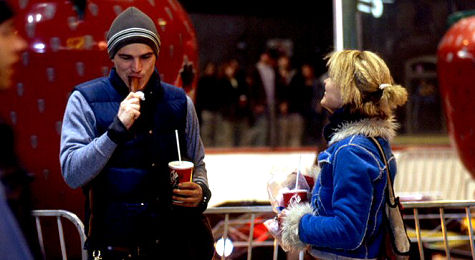
The only reps at yesterday’s screening were producer Robert Lawrence and Jerry Newport, the real-life model for Hartnett’s Donald (i.e., the original “whale”).
Newport’s real-life story will soon appear in a book he co-wrote with wife Mary and former People writer Johnny Dodd (who was also at the screening) which is called “Mozart and the Whale: An Asperger’s Love Story.”
I searched around and found a poster for the film with an alternate title — Crazy in Love — which is vaguely offensive, if you ask me. Autistics are different but hardly nutso. They get life as fully and completely as anyone else, and seem to process it, in some ways, with above-average passion and even ecstasy.
Talk It Out
Triple Oscar nominee George Clooney (two for Good Night and Good Luck, one for Syriana) and the legendary Robert Towne (director-writer of Ask the Dust) stirred some talk soup in Santa Barbara last night (2.3) — Clooney at the Arlington, Towne at the Victoria.
This shouldn’t come as a surprise (and I’m wondering if it’s even interesting), but they both confirmed they’re a pair of sharp and likable operators. Clooney is a better “entertainer” than Towne — he’s as fast and funny as any comedian I’ve ever seen on Leno or Letterman — but both have the kind of seasoning and assurance that you can’t help but settle into.
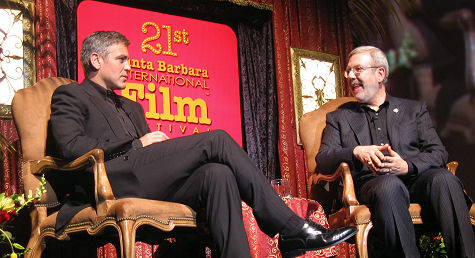
George Clooney, Leonard Maltin at Santa Barbara’s Arlington theatre — Friday, 2.3, 8:50 pm.
I’ve seen Clooney sit down two or three times over the last several weeks, and each time he’s had the same black leather lace-up shoes — nicely old-fashioned, probably Italian-made. Towne is more of a cross-training shoe or mountain-boot type of guy. Sorry, but I happen to feel that footwear matters. It betokens attitude and character and self-image.
You want me to continue or should I just post the photos? Because I have shit to get to this morning. Actual screenings, I mean, along with the usual parties and seminars and long easy strolls down State Street. It’s a tough beat, the Santa Barbara Film Festival, and not for the faint of heart.
The problem with attending glamorous film festivals (for journalists, I mean) are the constant temptations leading to a general undermining of journalistic discipline. There sirens singing songs in this town that are no less threatening than those who tried to lure Ulysses and his men to their doom.
I asked Towne towards the end of his Victoria theatre session which film he admires the most among the five Best Picture nominees, and he said without hesitation that Capote tops his list — for the discipline of it, the lean visual style, and the fascinating portrait of a “monster”…not Clifton Collins’ Perry Smith but Philip Seymour Hoffman’s Truman Capote.
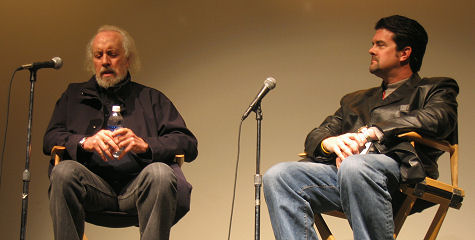
Ask the Dust director-writer Robert Towne and a journalist/interviewer who didn’t identify himself at Santa Barbara’s Victoria theatre — Friday, 2.3., 6:10 pm.
The Clooney show — a chat with Leonard Maltin and a shitload of film clips — didn’t get started until 8:30 pm, and ended around 10:40 pm. Clooney and Maltin had to be whipped after 130 minutes of tap-dancing and brisk banter. I’ve done this kind of thing and it’s like acting in a play. It feels great when you’re up there and kicking, but when it’s over you feel like you’ve boxed for 15 rounds.
Clooney was so beat after the show he barely stuck his head into the after-party before turning around and scramming. I can’t say I blame him given the fact that the soiree was held in an underground parking garage and was basically a sprawling “pig fuck” — sorry, but that’s the standard term for an overcrowded film festival gathering.
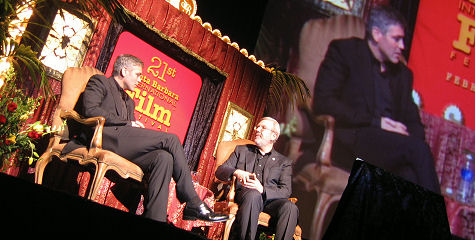
Clooney, Maltin — Friday, 2.3, 8:55 pm.
There’s something about standing around on hard concrete with three or four hun- dred others that just…I don’t know…makes me feel all swoony. Everyone milling around in an atmosphere of bluish light and aimless wandering, and with so little in the way of edibles that people were swarming over waiters, covering them like locusts, when they appeared with hors d’oeuvre trays.
It took me and my two Texas girlfriends a long time to get into the VIP lounge, and then came the word that Clooney wouldn’t be showing so we finished our glasses of wine, ate a few more cheese squares, said our goodbyes and called it a night.
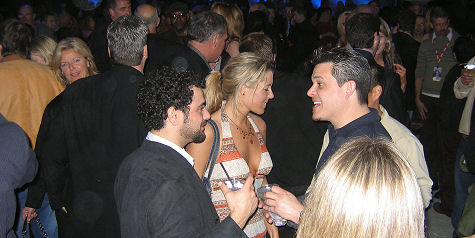
At the parking garage Clooney-no-show after-party — Friday, 2.3, 11:25 pm
Face It Down
It took me a few hours to come to this, but Robert Towne’s Ask the Dust (Para- mount Classics, 3.10), which I saw last night at Santa Barbara’s Arlington theatre, is about how self-acceptance — who you really are, where you come from, what you’re feeling deep down — brings clarity and with that the noblest kind of strength, which is the ability to love.
It took me most of last night and a couple of hours this morning to come to terms with this movie and what it actually is and how I feel about it, but I guess anything of value takes a while to attain.
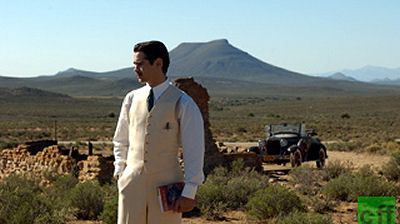
Colin Farrell in finale of Robert Towne’s Ask The Dust (Paramount Classics, 3.10)
This is the core of Ask the Dust, the payoff…but as with any film or play or novel, it’s the journey that counts. And the path of Ask the Dust is a bit old-fashioned because it feels and often looks like a play. But I admire the ballsiness of a film that stands its ground and says take it or leave it because it’s about a great writer who knew what he was doing and knew from integrity, and either you get that or you don’t.
There are inch-deep movies that are all about external visual stuff and cut like heebie-jeebie music videos that leave you with nothing, and there are delicate haunted-soul movies that are about internal stuff and fully-absorbed human experience, and which pay off at the end because they’re about something.
Some who see Ask the Dust may shift around in their seats a bit, but this is a film that knows what it’s doing and gets to where it’s going. It is what it damn well is.
Based on John Fante’s simple but fine little novel of the same name (which was written in 1939), it’s about a cocky young Italian writer named Arturo Bandini (Colin Farrell) and a young Mexican woman named Camilla (Salma Hayek) with whom he has a feisty relationship with, and I got it and respect it all the more today. I found parts of it serene and nourishing, and I can still feel them inside me as I sit inside my extra-large suite at the Fess Parker Doubletree on Friday at 10:35 am.
Dust is meditative and sometimes talky as shit, and it feels visually claustrophobic in the middle section, but this is the kind of life a poor writer leads (sitting, thinking, typing, dreaming and feeling all manner of hunger) so you can’t say it’s not honest.
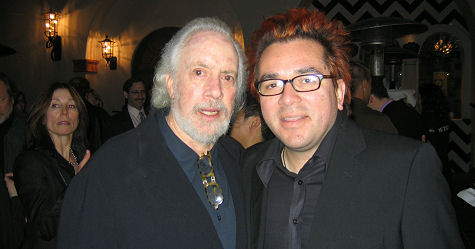
Ask the Dust director-writer Robert Towne, Santa Barbara Film Festival director Roger Durling at Thursday night’s after-party in a large outdoor mall off State Street
And it pays off at the end, and you can’t say it’s not wonderfully written, and there’s a spiritual element in the water table if you settle down and let it soak in.
I was in and out as I watched it, but this is the kind of film that comes together the next morning. You can say “not for me…I want the movie to pay off completely as I’m watching it” and I hear you, but movies that take a few hours to percolate are always the ones that we remember and value more because they hold up over time.
The recently-out-of-rehab Farrell (this is probably why he didn’t attend last night’s screening) gives the most open, intimate and charming performance of his career here.
I loved the nonverbal instinctual places Farrell went to in Terrence Malick’s The New World, and there’s no overlap here — his Bandini (Fante’s alter ego) is an alert and focused “performance” of the older school. But he looks trim and young (I was expecting him to look a tiny bit bloated, given his off-screen reputation), and he manages the feat of making Bandini, who lets go with what seems at first like inexplicable cruelty in the first half, half-likable or at least tolerable.
And Hayek’s Camilla is deeply touching…a sad, sickly woman with a relentless spirit and a big heart…a woman who takes a lot of racial abuse and at the same time stands up and calls her abuser’s bluff, and in the end gathers a kind of dignity that is hard to forget. People of Hispanic heritiage were telling me last night that her performance carries a special poignancy.
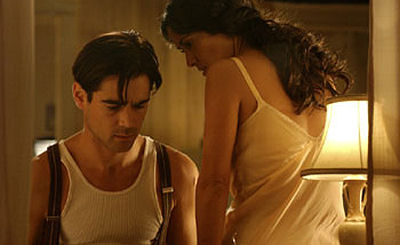
The Paramount Classics marketing guys will probably try to sell this as a steamy love story between Farrell and Hayek (there’s a skinny-dip-in-the-surf scene that fully supports this notion), but thematically this is basically the same movie as Curtis Hanson’s 8 Mile.
That 2002 film was about Eminem being unable to rap with confidence or clarity until he stands up and admits he’s just this grungy white kid from a trailer park with a loser alcoholic mom. Dust is about Bandini coming to terms with his roots and how his own rage about suffering ethnic prejudice as a boy leads to treating Camilla disrespectfully and even cruelly in the same vein, and how accepting this helps him get past the crap and find his voice.
Give up the pose and the attitude, admit who and what you really are, and you’ll be able to move on and be a man.
Fante is a superb naturalistic writer whose stuff feels poetic and yet hard and pretense-free in the Hemingway mode. It’s easy to see why the great Charles Bukowski was such a big fan, and of “Ask the Dust” in particular.
The aura and aroma of Los Angeles in the late 1930s is on every page of Fante’s book, and to be frank I wish Towne and his producers had gotten more dough together so he could have provided more pre-war L.A. atmosphere. I wanted to see and smell the way the entire town was back then, but all you get in Ask the Dust is a nice outdoor set of the downtown Bunker Hill area and a few shots of a forest and a beach.
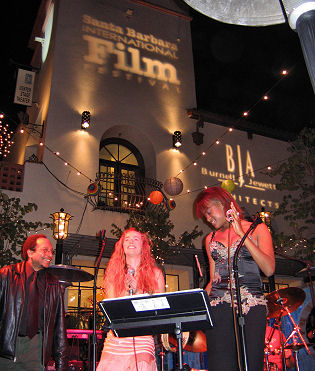
Thursday night’s party for the opening of the Santa Barbara Film Festival
It’s odd how this film feels as right as it does this morning, but felt like a half-and- halfer last night. Maybe I’m not deep or smart enough to get complex works in one sitting.
A lady who was with me didn’t like it — she called it Bite the Dust — but there’s no right or wrong way to process any half-serious film unless it’s an out-and-out piece of shit.
Ask the Dust is a gentle bittersweet thing about the hard and sometimes cruel things that people do to each other (because they suffered the same blows when they were younger, etc.) before the fog lifts and the cycle ends…if they’re lucky. There’s a kind of daring ugliness to this portion of the film. Farrell and Hayek goad and prod each other with racial epithets and scrappy put-downs that hurt… much more provocative than the usual romantic b.s. about a couple fighting because they’re attracted to each other, etc.
Dust is a movie with dignity and a tender heart and not a whole lot of action, but to have punched it up just to punch it up would have been a dishonorable way to shoot Fante’s book.
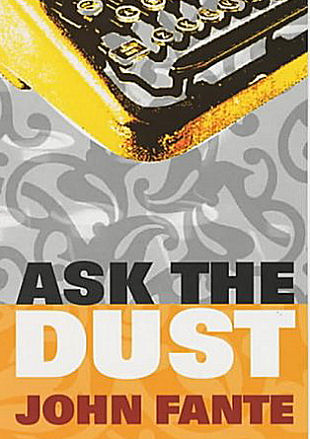
Impatient moviegoers can reject the whole package if they want…Hayek, Fante, old-time L.A. atmopshere, Towne, Bukowski, Farrell…and it’s a free country, but things may feel a tiny bit flatter and poorer if they do.
Side note: Ask the Dust opens in about five and a half weeks and the website still says “official site coming soon.” This is bush-league behavior…an indication that the distributor doesn’t care. Get the site up and running this weekend, guys, and stop jerking off.
Once Upon a Time
I’m thinking of a film about two men in love with each other, but one of them loving a bit less. They have sexual hunger for women and children are sired, but nothing approaches their feelings for each other. They’re pried apart by social-political con- cerns and they never quite mesh, but the man who loves a bit more can never quit his feelings. He doesn’t know how, and he hurts badly as a result.
And then one of them is killed by a group of violent men who despise what their victim stands for, and finally the longish movie (lasting over two hours) ends with the survivor lamenting his dear friend’s passing and talking quietly to his ghost.
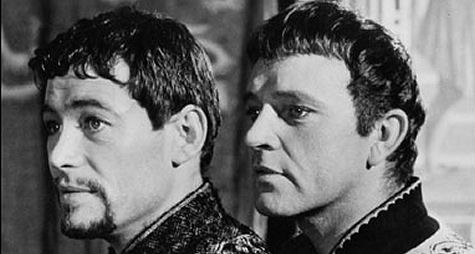
Peter O’Toole, Richard Burton in publicity still for Peter Glenville’s Becket
The men with unquenchable feelings for each other are played by movie stars in their prime, the movie is funded by a major studio, and come January it is honored with a slew of high-prestige Oscar nominations — Best Picture, Best Actor, Best Supporting Actor, Best Director, Best Adapted Screenplay, and so on. Everybody admires or at least respects it, and the reviews are almost 100% ecstatic.
The movie, of course, is Peter Glenville’s Becket, which came out just shy of 42 years ago. But the element of men in love with each other (in a not-quite-sexual way) was no less pronounced or emotionally intense than the love affair in Broke- back Mountain, except for Becket‘s lack of depicted physical intimacy.
And yet it’s a film in which the lead actors share a bed in the first act, with one of them confiding to the other a few pages earlier that “I can’t bear to think of you in pain.” They argue fiercely during a third-act scene about rejected feelings of love between them, and a disapproving female accuses one of having “an obsession” for the other that is “unhealthy and unnatural.”
In fact, it’s more than a little bit astounding that a movie as “gay” as Becket was released five years before the Stonewall riot and the beginning of the gay rights movement, and that it was made by the stodgy-at-the-time Paramount Pictures, and was performed by two of the era’s most respected actors (Peter O’Toole and Richard Burton), and was patronized by straightlaced audiences who had probably never considered the idea of emotional dignity between homosexual men.
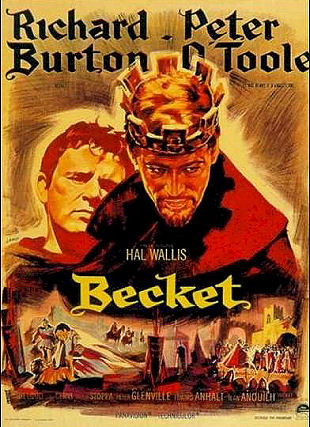
In short, there are a lot of striking similarities between Becket and Brokeback Mountain. So many, in fact, that the stage has been pretty much set by James Schamus and Ang Lee’s western for Becket to enjoy a whole new level of interest on DVD.
But years after plans were first made by MPI Home Video to bring out a loaded Becket disc, complete with a making-of documentary and a commentary track by Peter O’Toole, the chances of it coming out any time soon seem…well, a bit up in the air.
MPI Home Video marketing executive Greg Newman says the DVD will be out “this year,” but his reluctance to speculate about whether he’s speaking of the spring, summer, fall or winter indicates that MPI’s plans are perhaps less than rock-solid. Newman’s vagueness suggests that the Becket DVD, whenever it finally peeks through, may strike when the iron is cold.
Unless, of course, it happens to be released at the same time that Brokeback Mountain comes out on DVD, which will probably be in the late spring or early summer.
I know that no video company would be forecasting an ’06 release of a major title in late January without having formulated some kind of ballpark or target release-date in their heads.
And I can’t imagine Peter O’Toole not having questions about the Becket DVD also, some two years and four months after taping his supplemental interview footage and voice-over commentary for MPI in London, in the fall of ’03.
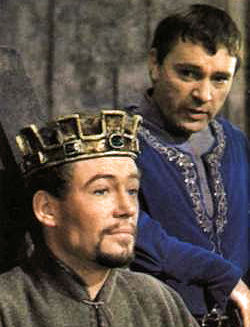
Becket has been out of circulation for several years due to a rights-and-revenue issue and the family of Jean Anouilh, the French author of the original stage play of “Becket” that Glenville’s film was based upon. Plus the 40 year-old film elements had deteriorated. But a 35mm version was restored about three years ago by the Academy Film Archive, with support from the Film Foundation.
Around the same time (i.e., the summer/fall of ’03), MPI, which has owned the video rights for a long while, began making plans for a DVD release of the film. The revenue issue with the Anouilh family has finally been resolved, I was told by an MPI spokesperson on Monday, but there’s still a measure of uncertainty about anyone seeing a DVD of Becket with a firm date in mind.
I think it’s fair to say that the Illinois-based MPI Home Video is known for being a small-time, not-quite-in-the-hip-groove-of-things outfit, and it seems a shame that a film as good and valuable as Becket should be land-locked with a company of this calibre. Becket is clearly the kind of highly-valued classic that should be released by a toney video company like Criterion or Acorn Media.
I saw Becket on a big screen in the summer of ’04 and again at a UCLA class that I moderated last spring, and it holds up very nicely. Burton is masterful as Thomas Becket, but O’Toole’s performance as King Henry II is one of the most exciting ever seen in a mainstream movie. O’Toole takes your breath away half the time, and the other half he makes you grin with delight.
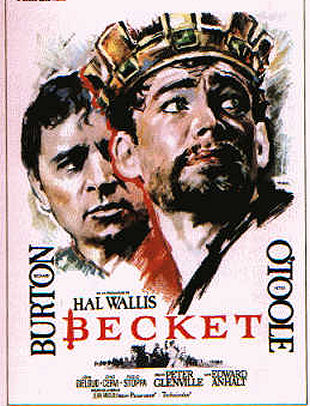
Nominated for 12 Oscars (but winning only one for Best Adapted Screenplay), Becket isn’t just a touching story about unrequited love but one that manages to dramatize in a recognizable way what it is to experience profound spiritual growth.
It’s a conventional costume drama in some respects, yes, but it’s one of the smartest and most engrossing features ever made in this vein. Directed by Glenville from a screenplay by Edward Anhalt (who adapted Jean Anouilh’s play), photographed by the great Geoffrey Unsworth and edited by Anne V. Coates, Becket feels slightly hemmed in by the conventions of prestige-level filmmaking as they existed in the mid ’60s, but the delivery and the talent levels are tip-top.
MPI has owned the film for several years but contributed nothing to the Academy’s restoration costs (about $125,000, give or take), which were covered by the Film Foundation. The restoration work was handled by Mike Pogorzelski, who provided the print of Becket that was shown at UCLA last March.
Newman told me almost two years ago that MPI got O’Toole to record a commentary track in London in the fall of ’03. The 71 year-old actor talked all through the 2 hour and 29 minute film, Newman said.
“We’re still doing quite a lot of the technical work for the DVD and everything else,” Newman told me in the summer of ’04, “and we’re going to have a hell of an extras package, and these releases take time. I hope that it will come out next year.”

Newman was referring to a 2005 release, which never happened.
“Remember, we’re coming right on the heels of this restoration thing,” Newman said. “It was only finished recently.” When he said this, the restored Becket had been screened in London seven months earlier.
The crux of the restoration was about the original stereo mix of Becket being digi- tally reconstituted. “That’s what the restoration was mainly about,” I was told in the summer of ’04.
“MPI never invested in the film,” says restoration specialist Robert Harris, who wanted to restore Becket a decade ago. “If the Academy hadn’t done it, those audio tracks would have been trashed. The Academy is an angel here.”
Harris told me that MPI “should pay the Academy back out of their first earnings, because without the Academy’s efforts they wouldn’t have a film to release.”












